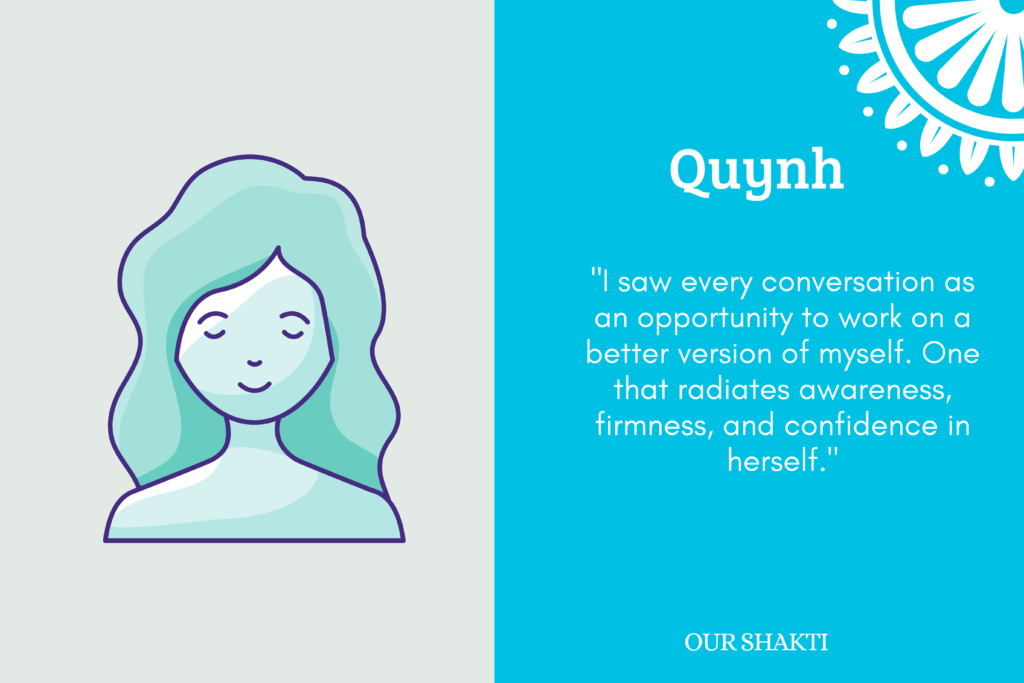The interview of the month is about depression. Mental health is one of the main themes of Our Shakti because it is an increasingly important topic due to current social developments. Today I interview Quynh, a smart woman from Rotterdam, the Netherlands. She is half Dutch and half Vietnamese, 33 years old, and she recently became the mother of a cute little boy. Her hobbies are baking, taking a stroll in the park, and calligraphy.
Quynh, you suffered from a depression in the past. How did you feel about mental health before you got depression? What did you learn about this in your upbringing or at school?
My parents didn’t teach me anything about mental health. They didn’t care about it. I think it is due to the fact that before 1990 there was little to no attention for it. My parents’ generation thought that marriage, family life, and work were important. That meant happiness. It didn’t matter what kind of marriage it was or how good/bad family life was as long as they got married and had kids. Today’s generation is different. We may still want the same things, marriage, kids, career, but we know that it doesn’t necessarily make you happy. We are now more aware of mental health as it is talked about a lot by influencers/therapists such as Jay Shetty, Brene Brown, and Nedra Tawwab. Mental health and self-love are hot topics. I didn’t learn anything about this subject in school.
What was the cause of the depression?
I think my depression stemmed from the low self-esteem that I developed during my childhood. It was to be expected that something would go wrong. As a child, I was well-behaved, shy, and quiet. I tried to make everyone happy. I had developed a disease to please and when I was in my twenties I found out that it was because of my mother.
I would describe the relationship with my mother as toxic. My mother’s love is based on conditions. In her eyes you should do the things that make you a good daughter, then everything will be fine. If you do things that she doesn’t like, you will be judged, criticized, or persuaded not to do something she does not like. I was also often compared to cousins who in her eyes would do better than me. She also did this with my brother. Comparing to others.
It was very confusing for me as a child, because she also has a sweet and caring side. That made it toxic and unstable. All in all, this caused me to have low self-esteem as I felt like I wasn’t good enough. In relationships, this was expressed by being as nice as possible, and when a relationship didn’t go well I blamed myself.
How did you find out you were depressed?
It was mainly the feeling of being deeply unhappy that persisted that made me feel like things are not right. Normally when I was sad I talked about it with others and it was something that went away. This continued for months and I cried a lot when I was alone. I never cried so much. I realized that talking about it with friends didn’t make it go away so I realized that I needed professional help.
Did you find it difficult to seek help?
Yes, absolutely. I especially found it difficult to admit to myself that something was wrong. It’s like hurting your knee and seeing it swell. You know something isn’t right and you fear the worst when you’re on your way to the doctor. So on one hand I had the realization that something was not right, but on the other hand, I was afraid of the unknown. People also have all kinds of associations with depression, for example, that you are crazy, mentally weak, or suicidal. I didn’t believe to fit in that alley.
Can you tell us more about how getting into therapy works?
I went to the GP and was then referred to a psychologist. I received an intake interview on location. There I filled out a questionnaire on the computer and I received a diagnosis. I would take a short course of six months and then test again to see if further treatment was needed. A short trajectory sounded very little to my ears as this had been going on for years, but in hindsight, it was enough. Trust the experts. Every two weeks I had an appointment with the psychologist for 1.5 hours. After the intake interview, you have the opportunity to indicate whether you want to continue with the psychologist. If there is no match, you can say no and you will get an introductory meeting with another psychologist.
What was it like being in therapy?
The first two conversations were uncomfortable because I felt ashamed to tell everything. They are things that you have kept to yourself for a very long time. However, over time I felt more and more comfortable and that was because my psychologist was very good. She explained things clearly, gave me new insights and exercises that I could use. I even liked it at one point and looked forward to our conversations. It was very educational.
What did you like?
You learn more and more about yourself. Patterns, expression of emotions, how you react in certain situations, what triggers you, what you find difficult to say to another and why. You are very conscious of it and you also look for things. You have to imagine… I knew absolutely nothing about mental health or psychology. Then you have conversations and you learn about all kinds of theories, you get to see diagrams and schemes. There is a whole science behind it and it will pass you by if you are not experiencing depression unless you make the effort to study it yourself. I saw every conversation as an opportunity to work on a better version of myself. One that radiates awareness, firmness, and confidence in herself.
What are two things you have learned?
About depression itself. That it’s not even as bad as we think it is. Not the feeling. It’s really a feeling I wouldn’t want to experience again, but if I hadn’t had depression I wouldn’t be the person I am today. I notice that I am much more confident, I have knowledge about myself and others, and that experience has really only helped me. I am much more conscious in life and think better about what I say and how I say it. I know when to let go of things because it is not in my power and belongs to the other. I would even say that depression is one of the best things that happened to me. It has contributed to my personal growth as a mature woman.
When you enter such a process, you have no idea what is going to change and whether you want to change. Some people keep telling themselves that they are sad and when a psychologist comes up with tools to create more control over their own lives, they come up with all kinds of reasons why that won’t work. I have learned that you have to enter this process with an open mind, but above all with an attitude to want to change. Then you get the most out of such a process. You will notice that you come to different insights about life in a general sense, but also daily changes in behaviour.
How did your environment react to the fact that you had depression?
I told my friends at the time. They have been very supportive of me. I think you don’t have to share everything with others and it was a good decision because I could figure things out for myself in peace.
Did others notice that you were depressed?
Not that I know. Of course, they may have suspected it. Everyone experiences depression in a different way. Some people exhibit visibly different behavior. Others can keep it well hidden. I was always happy to see people and when I went home I felt unhappy again. So those people would not have quickly realized that I was depressed.
What do you remember most?
Since I had a disease to please, I would say you owe it to yourself to take your own needs seriously. I’ve learned to act on my own needs and that can sometimes mean that others feel hurt, disapprove of my actions, or they are unable to meet my needs. But that’s okay. As long as you do what gives you peace or makes you happy.
I remember we did an exercise where she took on the role of my mother and yelled nasty things at me. On the table she had drawn a line between the two of us, on my side of the line was my space of influence and my territory. Every time when she yelled nasty things she would throw a crumpled ball of paper or a pen over the line so it ended up in my area. She said it is your responsibility to take ownership over this territory and to keep it clean. She asked to throw everything in my area that didn’t belong there behind me. First I picked up a wad and tossed it gently behind me. Then she laughed and said: you can throw it harder. So I started grabbing everything and throwing it behind me. Then the conversation continued for a few more minutes and at the end, I wanted to pick everything up from the floor. Then she said, “Don’t touch anything! You leave everything here. I’ll clean it up later.” I walked out the door with a feeling of relief. That’s how it feels when you remove the negative junk of others from your area. Often you do not realize what other people’s comments do to you, because it is not tangible. When you see it lying on a table like this, you understand. Like hey, this is my space and this causes my area (mental health) to get polluted.
What is important to overcoming depression?
I think you should keep doing the exercises. Your environment does not change. All you have control over is your own behavior and the things you say or don’t say. And always make sure you make time for yourself to relax. For example yoga, meditation, or walking in nature. Make it a regular part of your life. That also helped me a lot.
What is your advice to others?
I recommend anyone who thinks they are or have been depressed to seek help. Don’t put it off. It’s going to help you. It is important that you get professional help because depression returns if you get stuck in old patterns. You can only overcome it through self-insight and consciously learning a different behavior. Your environment will not react enthusiastically to that, because they are not used to it from you. I experienced this myself, but I had developed such a high and positive self-image that I could ignore their reaction. And that really feels like a victory.

